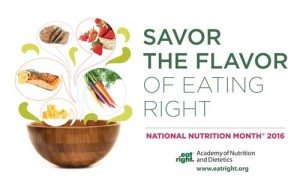 In March, Great Care and the Academy of Nutrition and Dietetics celebrate National Nutrition Month. The month is the chance for seniors and their caregivers to focus on the importance of making informed food choices and developing sound eating and physical activity habits.
In March, Great Care and the Academy of Nutrition and Dietetics celebrate National Nutrition Month. The month is the chance for seniors and their caregivers to focus on the importance of making informed food choices and developing sound eating and physical activity habits.
“During National Nutrition Month and beyond, make an effort to cut back on food and beverages high in added sugar, sodium and saturated fats,” says registered dietitian nutritionist and Academy spokesperson Lisa Cimperman. “Take the time to find creative, healthful and nutritious ways to add flavor to food.”
According to the NIHSeniorHealth.gov website for older adults, eating a well-planned, balanced mix of foods every day has many health benefits.
“Eating well may reduce the risk of heart disease, stroke, type 2 diabetes, bone loss, some kinds of cancer, and anemia,” says NIHSeniorHealth. “If you already have one or more of these chronic diseases, eating well and being physically active may help you better manage them. Healthy eating may also help you reduce high blood pressure, lower high cholesterol, and manage diabetes.”
The Academy of Nutrition and Dietetics’ 2015-2020 Dietary Guidelines for Americans recommends limiting added sugar, sodium and saturated fats, as many Americans follow diets too high in these components. Cimperman suggests choosing foods and beverages with no added sugar whenever possible.
She also suggests reading food labels and avoid buying foods with added sugars like high fructose corn syrup, dried cane syrup, evaporated cane juice, invert sugar, molasses, sucrose, brown rice syrup, honey, agave or maple syrup.
“Also, drink water, low-fat or fat-free milk and 100-percent fruit or vegetable juice instead of sugary beverages. Choose snacks with no added sugar. Eat plain yogurt instead of flavored yogurt with whole fruits such as berries or pears,” Cimperman says. “Grill fruits such as pineapple or peaches for a naturally sweet and healthier dessert. Eat smaller dessert portions. Often a bite or two will satisfy your sweet tooth.”
Sodium, especially in senior diets, can be a concern as salts are added during commercial food processing and preparation. Cimperman suggests buying frozen or canned products without added salt, and fresh poultry, seafood, pork and lean meat rather than processed meat and poultry.
“Cook meals from scratch to control the sodium content of dishes,” she says. “Buy fewer jarred sauces and pre-flavored products. Flavor foods with citrus, herbs and spices instead of salt.”
Reducing saturated fat intake to less than 10 percent of calories per day is also an important goal of National Nutrition Month. Saturated fat is found in foods such as meats, whole milk, cream, butter and cheese. Unsaturated fat, which includes polyunsaturated and monounsaturated fat, is found in foods like oils, fatty fish, nuts and seeds.
“It’s important to understand the different types of fats, and reduce your intake of saturated fats by replacing them with unsaturated fats,” Cimperman says. “Drink fat-free or low-fat milk (1-percent) instead of 2-percent or whole milk, and eat low-fat cheese instead of regular cheese, oils instead of butter and lean rather than fatty cuts of meat.”
The Academy of Nutrition and Dietetics website (eatright.org) includes helpful articles, recipes, videos and educational resources to spread the message of good nutrition and an overall healthy lifestyle for people of all ages, genders and backgrounds.
Consumers are also encouraged to follow National Nutrition Month on the Academy’s social media channels including Facebook and Twitter using the #NationalNutritionMonth hashtag.
Follow Us!